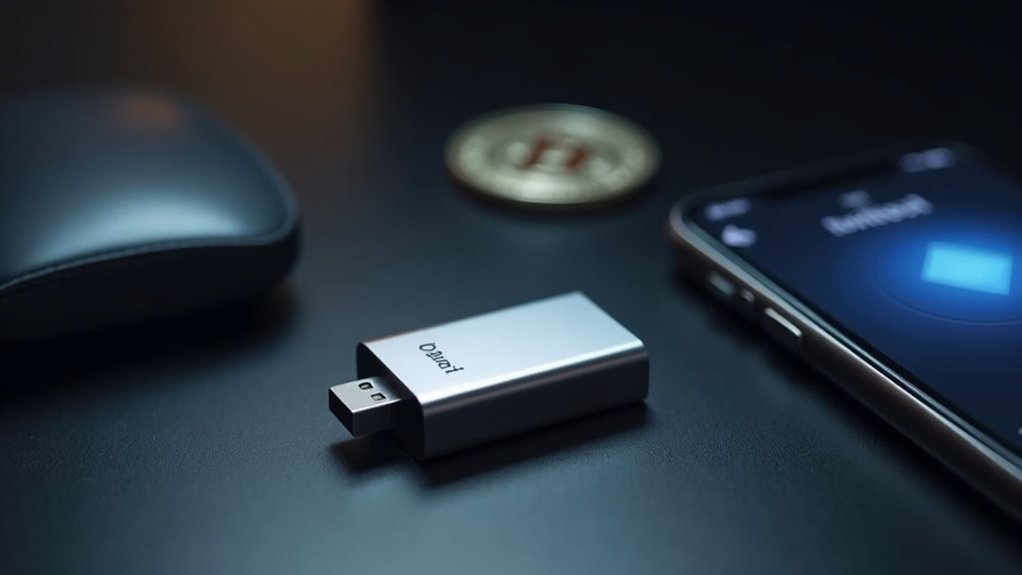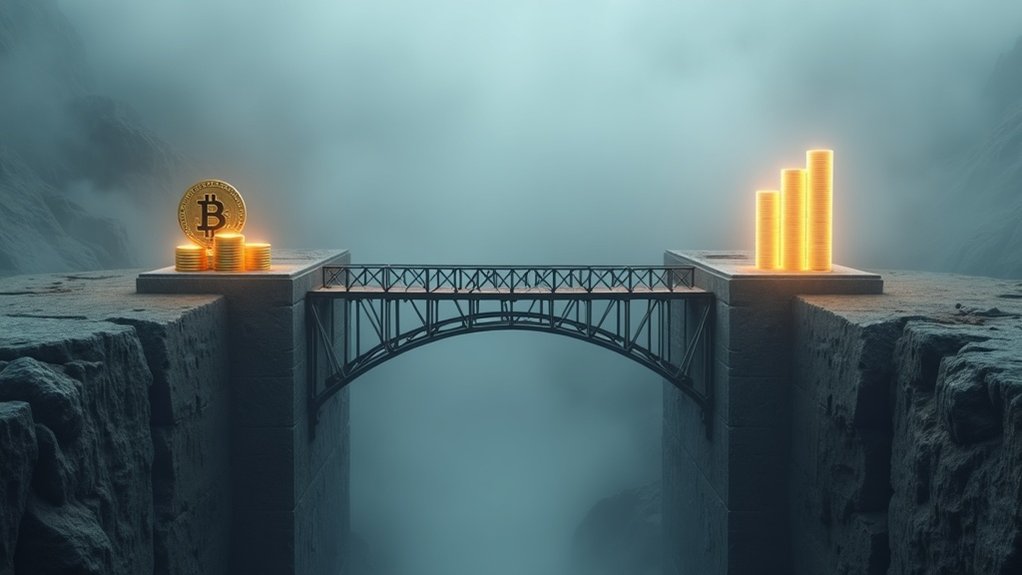Bitcoin is a decentralized digital currency created in 2009 by the mysterious Satoshi Nakamoto. It operates on blockchain technology without central authority or banks. Transactions get validated by miners who solve complex puzzles and receive rewards. Bitcoin has a capped supply of 21 million coins, creating built-in scarcity. Users store funds in wallets secured by private keys—lose that key, lose your Bitcoin. Forever. The global impact? Already revolutionary, despite the skeptics.
Money evolved. What began as shells and stones transformed into gold, paper notes, and now, digital currencies. Bitcoin stands at the forefront of this evolution – the first decentralized cryptocurrency launched in 2009 by the mysterious Satoshi Nakamoto. It’s completely digital. Completely intangible. And completely revolutionary.
Bitcoin operates on a free-market ideology with no central authority pulling strings. This isn’t your grandfather’s currency. It runs on a peer-to-peer network where thousands of nodes maintain copies of the same ledger. No middlemen. No bureaucracy. Just cold, hard cryptography securing every transaction.
The backbone of Bitcoin is its blockchain – a public ledger recording every confirmed transaction since inception. Think of it as an unalterable digital history book, continuously updated across the entire network. Each transaction gets bundled into blocks, which link together chronologically. Once recorded, it’s practically written in digital stone. The halving mechanism reduces mining rewards by 50% every four years, ensuring Bitcoin becomes increasingly scarce over time.
Using Bitcoin is surprisingly straightforward. Users create transactions specifying recipient addresses and amounts, signing them with private keys. These transactions broadcast to the network where miners validate them. Yes, miners – the digital prospectors who secure the network by solving complex puzzles. They’re not doing this out of charity. They earn 6.25 bitcoins per block for their troubles.
Bitcoin wallets store the essential keys needed to access and transfer funds. The public key functions as your address – like an email for money. The private key? That’s your password. Lose it, and your bitcoin disappears into the digital ether. Forever.
El Salvador made history in 2021 as the first country to adopt Bitcoin as legal tender. Not everyone’s so enthusiastic. Some countries have banned it outright. Bitcoin’s supply is mathematically limited to 21 million coins, creating a scarcity that fundamentally differs from traditional currencies. Regulatory concerns abound, particularly regarding its pseudonymous nature.
Bitcoin mining consumes significant energy. Critics call it wasteful. Advocates call it necessary security. Both have points. The system is imperfect but ingenious – a decentralized network replacing centuries of financial intermediation with mathematics and code. This trustless system eliminates the need for third parties to verify transactions, allowing users to interact directly with complete confidence.
Frequently Asked Questions
How Does Bitcoin Mining Affect the Environment?
Bitcoin mining wreaks environmental havoc.
It devours electricity—34 U.S. mines alone consume more power than Los Angeles. Most of this comes from fossil fuels.
The carbon footprint? Massive.
We’d need to plant nearly 4 billion trees to offset it. That’s the Netherlands in trees, folks.
Mining also creates air pollution affecting millions of Americans and guzzles enough water to supply 300 million Africans.
Cross-border pollution makes regulation tricky.
Not exactly earth-friendly tech.
Can Governments Effectively Regulate or Ban Bitcoin?
Governments face serious challenges regulating Bitcoin. Its decentralized, global nature makes complete bans nearly impossible to enforce.
When countries try, activity just goes underground or offshore. Really frustrating for regulators.
The SEC and CFTC are still fighting over who’s in charge.
Meanwhile, technical limitations hamper effective oversight. Blockchain is complex stuff, and many regulators simply don’t get it.
Some regulation? Sure. Total control? Dream on. Bitcoin was designed to resist exactly that.
What Happens to Bitcoin When All 21 Million Are Mined?
When all 21 million bitcoins are mined (around 2140), block rewards disappear completely.
Miners will rely solely on transaction fees. Network security? That depends. If fees aren’t lucrative enough, miners might bail. Less mining power means potentially weaker security.
Bitcoin’s value could increase due to absolute scarcity. The economic model shifts dramatically. No more new coins, ever. The community fiercely defends this cap – changing it would cause chaos.
Bitcoin becomes truly deflationary. Simple as that.
How Do Bitcoin Futures and ETFS Impact Cryptocurrency Markets?
Bitcoin futures and ETFs are reshaping crypto markets. Period.
They’ve consolidated liquidity on traditional exchanges and improved price stability.
ETFs now account for 10-15% of Bitcoin trading volume and hold over 3% of circulating supply.
Short-term prices jump with ETF inflows, but long-term? Not so much.
Market concentration has increased, with IBIT dominating at 70% market share.
Funny how Wall Street eventually gets its piece of every pie.
What Role Does Bitcoin Play During Economic Uncertainty?
Bitcoin serves as a potential safe haven during economic turmoil.
Some investors view it as a hedge against inflation and currency devaluation—digital gold, if you will. When governments print money like it’s going out of style, Bitcoin’s fixed supply looks pretty attractive.
Market behavior isn’t consistent though.
Sometimes Bitcoin tanks alongside stocks during panics. Other times it soars. Central bank policies matter too. Higher interest rates? Not great for Bitcoin. Economic uncertainty? Complicated relationship, at best.









